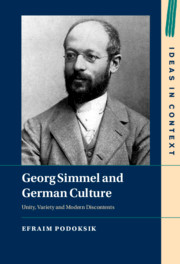Book contents
- Georg Simmel and German Culture
- Ideas in Context
- Georg Simmel and German Culture
- Copyright page
- Contents
- Acknowledgements
- Note on Translations and References
- Introduction
- Chapter 1 Bildung, Kultur, Crisis
- Chapter 2 Unity in Variety
- Chapter 3 Unity versus Variety
- Chapter 4 Unity above Variety
- Conclusion
- Bibliography
- Index
Chapter 2 - Unity in Variety
Published online by Cambridge University Press: 07 July 2021
- Georg Simmel and German Culture
- Ideas in Context
- Georg Simmel and German Culture
- Copyright page
- Contents
- Acknowledgements
- Note on Translations and References
- Introduction
- Chapter 1 Bildung, Kultur, Crisis
- Chapter 2 Unity in Variety
- Chapter 3 Unity versus Variety
- Chapter 4 Unity above Variety
- Conclusion
- Bibliography
- Index
Summary
This chapter analyses Simmel’s worldview during his early period (until ca. 1900). It argues that Simmel held an unusually optimistic view regarding the contradictions of modernity at that time, subscribing to the idea that modern differentiation leads to a comprehensive unity which naturally emerges from variety. This claim is supported by an analysis of Simmel’s writings of the period, starting from his early monograph on Dante and ending with his early sociology and his interpretation of Kant’s philosophy. In respect of sociology, it is argued that the young Simmel subscribed to a kind of reductionist sociologism in the spirit of the founders of Völkerpsychologie, Lazarus and Steinthal. In respect of Kant, it is argued that the young Simmel conceived of his thought as the ultimate philosophical solution to the problems of modernity, and that he distanced himself from Kant once he began to doubt the possibility of reconciling the contradictions of modernity.
- Type
- Chapter
- Information
- Georg Simmel and German CultureUnity, Variety and Modern Discontents, pp. 90 - 144Publisher: Cambridge University PressPrint publication year: 2021

